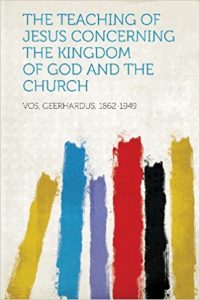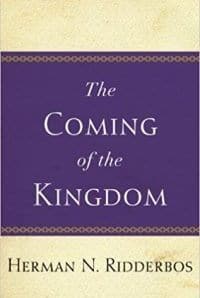Rarely are biblical scholars unanimous, but NT scholars pretty well all agree on one thing: the kingdom of God is the central theme of Jesus’ preaching.
Some students of Scripture have argued that the kingdom of God is also the central theme of all Scripture. At the very least, it is one of the Bible’s most important topics. Given the significance of the kingdom of God, why not study the topic this year?
A great deal has been written about the kingdom, but two somewhat neglected books by Dutch theologians could help you enter and explore this Bible study topic.
Vos
Geerhardus Vos is renowned as a biblical theologian, but his book The Teaching of Jesus Concerning the Kingdom of God and the Church is little known. Long before Oscar Cullmann or George Ladd argued the same, Vos showed that there was an “already/not-yet” character to the kingdom of God in Jesus’ teaching. Vos saw that this kingdom is tied to the renewing of our fallen world. He saw that its ultimate end will be the glory of God. He also saw that, at present, God’s emphasis is on bringing men and women to salvation from sin. He saw that when people are saved, they become members of the kingdom: they submit to the reign of Christ the King.
Vos does not say all that needs to be said about the kingdom. He could, for instance, have done more to display the connections between the kingdom and the creation blessing of Genesis 1:26-28—and between the kingdom and the Davidic covenant. In addition, Vos dismisses the material aspect of the kingdom as “chiliast,” though amillennialists since Hoekema have granted that premillennialists have not been in error on this point. Indeed, most amillennialists today see significance in the new creation. But the basic foundations for thinking about the kingdom are laid carefully by Vos in this seminal work.
You might want to pick up the book as part of the Select Works of Geerhardus Vos, which includes some of his better-known works: The Self-Disclosure of Jesus and Pauline Eschatology. Also included in this bundle is Richard Gaffin’s collection of Vos’ shorter writings, which includes an essay on the nature and method of biblical theology as well as an outstanding article on the title “Logos” in John 1.
Ridderbos
Herman Ridderbos’ The Coming of the Kingdom is better known than Vos’ book on the topic, but it, too, deserves more attention. Ridderbos provides not merely a study of the kingdom theme but a whole theology of the Synoptic Gospels that recognizes the centrality of the kingdom theme.
The great value of Coming of the Kingdom is its numerous exegetical discussions of key passages in the Synoptics. The other outstanding feature is Ridderbos’ exposition of why the kingdom came in an already-not yet fashion. Ridderbos argues that the kingdom had to come first in salvation before it came in judgment.
John the Baptist did not understand this distinction, which is why he warned about the coming judgment. Much of Jesus’ teaching about the kingdom was designed to help his followers see that the kingdom was going to come first in salvation before it came in judgment. The way Ridderbos develops this understanding is a masterful contribution to our understanding of the kingdom.
This volume is included in the Herman Ridderbos Collection, which also includes Redemptive History and the New Testament Scriptures, which is possibly the best book on the canon of the New Testament, and When the Time Had Fully Come, a collection of articles on New Testament theological topics.
The Kingdom of God
Reading through the entire Bible in the coming year is a great idea; many people do this. But one way to ensure that you come to the end of the year with something to hold on to is by spending your Bible reading time on a particular topic. Search the Scriptures, and you’ll see the kingdom theme pop up repeatedly. It will help put your Bible together for you as you read it through in years to come.
Brian Collins is a Biblical Worldview Specialist for BJU Press. He blogs at exegesisandtheology.com.
***
Get started with free Bible software
Compare translations, take notes and highlight, consult devotionals and commentaries, look up Greek and Hebrew words, and much more—all with the help of intuitive, interactive tools.







